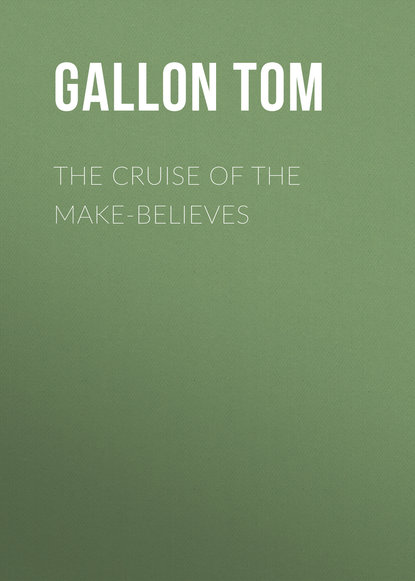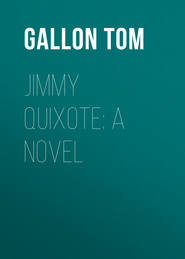По всем вопросам обращайтесь на: info@litportal.ru
(©) 2003-2024.
✖
The Cruise of the Make-Believes
Настройки чтения
Размер шрифта
Высота строк
Поля
"Coffee – served in cracked cups by a dingy maid – in a back-yard," he cried viciously. "There's nothing soothing or helpful or restful about coffee – and I'm too old to pretend that this place is anything but the back-yard it really is."
"It's better than any other garden in Arcadia Street," she said. "And at a time like this, when – when you don't see things so distinctly – it looks quite good. If you shut your eyes the least little bit, so that you can only just see out of them, you seem to be looking down long spaces – ever so far; and you can sit there under the wall, and think you're anywhere – anywhere in the world except in Arcadia Street."
"I have shut my eyes to a great many things far too long, Bessie," he exclaimed fiercely. "I have been inclined to forget at times who I really am, and the position I should have occupied. I let my children do as they like with me. Where, for instance, is your brother to-night?"
"Aubrey always goes out in the evening," said the girl quickly. "He likes his freedom, you know, father dear."
"I know his freedom," said the man; "the freedom of every low billiard saloon in the neighbourhood. No intellect about him, mind you; no discussing of matters of moment concerning the neighbourhood, and even the nation, with Aubrey. Oh dear, no; the knocking about of billiard balls is more in his line. Aubrey will never cut a figure in any resort of gentlemen. How much, for instance, did your precious brother receive out of the funds of the house – my house, mark you! How much did he receive this day?"
"Aubrey had half a crown," said the girl, in a mere whisper.
"Ye gods!" he exclaimed, starting to his feet. "He flaunts it with half a crown all over London, and his poor old father is shown the door in a pot-house, because he can't pay his score. Bessie, I could not have believed that you would sink so low!"
"Aubrey says that he must live," said the girl wistfully. "And he likes always to feel that he is a gentleman."
"Why doesn't he work?" exclaimed Mr. Meggison savagely. "He is young and strong – why should he borrow half-crowns; why doesn't he earn 'em instead? Things have come to a pretty pass when I – Daniel Meggison – am refused necessary refreshment in order that my son should flaunt it on half-crowns. Bah!"
"Somebody seems to be talkin' about me," said a voice from the doorway of the house. "What's the row?"
The youth who sauntered out, and stood with his hands in his pockets, looking from one to the other, was not of an inviting type. Shiftless son of a shiftless father, he lacked even that father's poor dignity, and failed to carry himself so well as the older man. He stooped at the shoulders, and his mean and narrow face was thrust forward, and bore an expression of knowingness, as though he asserted that there was precious little in this world you could teach him. A small billycock hat was thrust on the back of his head, and from between his lips drooped a cigarette; it was his proud boast that he was never to be seen without the latter.
"The row is this," exclaimed the old man, "that I want to know when you are going to take your proper position in the world – and do your proper work?"
"Don't you worry about me, dad," replied the son; "I shall be there all right when the work comes along. Always provided, mind you," he added as an afterthought, "always provided that the work suits me, and is of a sort that a gentleman can take up. No hole-and-corner jobs for me; I know what I want, and I mean to get it."
"You have already obtained from your sister here to-day a sum of money far in advance of your needs or your deserts," said old Meggison, wagging his head at him. "Pray what do you want with half-crowns?"
"Father – you shall have all the money you want as soon as I get any myself," pleaded the girl in a low voice. "Surely there is no need for quarrelling."
"I am not quarrelling; my dignity does not permit me to quarrel," said Daniel Meggison, shaking his arm free of her touch. "But I trust that I know what is due to me as that boy's father; I hope I know my duty."
"Hope so, dad, I'm sure," said the youth, as he turned away. "Can't see for the life of me what you're upset about. You've had your bit at times; you've been kept going, same as I have – haven't you?"
"My 'bit,' as you term it, is what is justly due to me as the head of this house," exclaimed the elder man.
"I wasn't aware that you were the head of the house," said the youth. "If it comes to that, Bess is the only one that does anything for what I'm pleased to call a rotten family. I'm not saying, mind you, that she does what she might, or that she looks up the lodgers for what's due with that business instinct she should; I'm only sayin' that she does what a mere girl can do tolerably well. More than that, she knows that her brother, bein' a gentleman, can't go about London with empty pockets."
"What about my pockets?" demanded Daniel Meggison, plunging his hands into them. "Who thinks of my wants – my simple ordinary little wants? Who deems it necessary even to know that I have that refreshment that is not denied to the lowest of the beasts?"
"The lowest of the beasts drink water," said Aubrey, with a chuckle. "And I never heard of you doin' that."
While Bessie stood looking helplessly from one to the other, and while a savage retort rose to the lips of old Meggison, the door leading from the house was opened, and a little servant-maid appeared. A precise and prim little maid, who, having come from some institution but a little time before, had felt ever since that she was seeing life as she had never hoped to see it; to her, indeed, the sorry garden was a place of delight. She came out now almost with eagerness, bringing that despised coffee on a battered tray, and set it on the rickety table. And at the same time announced some startling news.
"Oh, if you please, miss, a gent an' a lidy – name o' Stocker – was waitin' in the passage – "
"Hall!" thundered Mr. Daniel Meggison, so savagely that the child almost knocked over the coffee-pot. "How many times, Bessie, have I told you that the domestics are to be instructed to give proper names to the apartments in the house."
"You will be more careful in future, Amelia, won't you?" suggested Bessie mildly. She turned to her father, and spoke wistfully. "Perhaps Aunt Julia and Uncle Ted had better come out here – in the garden," she suggested.
"I will not see them," said Mr. Meggison. "I am in no mood to see anyone; I should probably insult my sister, to begin with. I dislike her as much as I dislike her absurd prosperity."
"Don't ask me to meet 'em," said Aubrey, making for the little gate in the wall. "Aunt Julia always asks a chap what he's doin' – as though earnin' your livin' was about the only blessed thing you'd got to do in this world."
"I'd be glad if you'd stop and see them, Aubrey," pleaded Bessie; then to her father she added slyly – "It will be so much more dignified if you stop and meet them, father."
"Perhaps it will; I will put up with them on your account, my child," said Mr. Meggison. "Aubrey – I command you to stay."
"Your commands don't affect me the least little bit," said Aubrey coolly, shifting his cigarette to the other corner of his mouth. "But on Bessie's account I don't mind lettin' myself be seen. Amelia – trot 'em out!"
Bessie Meggison having some idea of how these things should be done, from certain accounts she had read, or from certain things she had heard, immediately got behind the crazy table, the better to preside over that pouring out of coffee. She bravely shut her eyes to the fact that the cups did not match, and that the saucers were either too large or too small, or that the coffee-pot was a mere tin affair, blackened all up one side from contact with the fire. She waited in that proud position the coming of the unexpected guests.
Mrs. Stocker came first, looking about her with the high dignity of one who moves in a very different sphere, and who has condescended for once, in a spirit of Christian virtue, to step down among beings less fortunate. She was a large lady, holding herself very erect; the sort of person with whom you could not under any circumstances have cracked a jest. Life was a simple and a respectable thing with her; a serious matter, that could but lead in due course to a very proper and becomingly elaborate funeral. Women had been known to do remarkable things, and to get their names into books and newspapers; not so Julia Stocker. "From the moment Edward Stocker claimed my hand, I knew exactly what was going to happen to me, and I acted accordingly," was her invariable summary of the course of her life. Incidentally it may be mentioned that Mr. Edward Stocker had "a little property" and that Mrs. Stocker looked after it. Which is to say that Mr. Stocker was a mild good-tempered little man, with a partiality for convivial good company into which he rarely got.
The lady came out of the house now, looking about her somewhat disdainfully. She took Bessie's outstretched hand, and, still with her eyes searching the bare and shabby yard, touched the girl's cheek for a moment with lips that had no softness about them; performed the same ceremony with her brother Daniel; and stared at Aubrey Meggison. "I have come, brother," she said, in a voice that was in itself almost dirge-like, "to see how you are getting on."
"Very kind of you – but I'm not getting on at all," said Meggison, furtively rubbing the place on his cheek where her lips had been with his knuckles. "More than that, I don't expect to."
"Perhaps I should have said that we have come – Edward and myself – to inquire about you; for of course without Edward I never attempt to do anything. In my opinion the woman should always be dependent upon the man, and guided by him. Consequently, if Edward tells me that he desires that I should call and inquire about my relatives, I do so, however distasteful it may be to me personally. Edward – where are you?"
Mr. Stocker came from the house at that moment, holding his hat in his hand, and looking about him as though he felt he was in some place of historic interest. He saw Bessie's hand, and after looking at it for a moment or two, as though not quite certain what it was, or how it concerned him, decided to grasp it; and having done so looked up at the girl, and smiled in rather a pleased way. But he dropped the hand guiltily on hearing his wife's voice.
"Edward! – why are you loitering? Where are you?"
"Here, my dear," said Mr. Stocker, coming round the table, and still looking about him as though marvelling at the place in which he found himself. "Charming spot, this!"
"Charming fiddlesticks!" exclaimed Mrs. Stocker, sitting carefully on a chair. "A mere back-yard – with nothing in it but rags and rubbish and draughts. Surely you people don't live out here?" she asked, glaring round upon them.
"We like to come here in the evening, aunt; it's very pleasant then," said Bessie. "Will you have some coffee, Aunt Julia?"
"No, I will not have some coffee – especially in the open air," said Mrs. Stocker. "Nor will your uncle Edward have coffee," she added, noting a tendency on the part of that gentleman to reach for one of the cups; "it always disagrees with him. Not, of course, that I would wish for a moment to interfere with your enjoyment, Edward – but I think I know what is best for you."
Mr. Stocker sighed and turned away; found his way up to that improvised seat against the wall; and, with that luck that usually attends such men, discovered the loose board and almost went through; he was frantically readjusting his balance when Daniel Meggison, as though by the merest chance, strolled up to him and dropped a hand on his shoulder, and smiled in a friendly way.
"Glad to see you, Ted – always glad to see you," he said, keeping a wary eye upon Mrs. Stocker the while, and lowering his voice suddenly and dramatically. "You don't happen to have change for half a sovereign, I suppose?"
Mr. Stocker slipped his hand into his pocket, and brought out a small gold coin. "I don't think I have," he began in a whisper; and then discovered, something to his amazement, that by a species of conjuring trick the coin had disappeared from his hand and was entering the pocket of Mr. Daniel Meggison, who was beaming upon him.
"It doesn't matter – one coin's easier to remember," said Meggison. "You shall have it back – certainly within a week. You're a man to know, sir."
Mrs. Stocker was speaking in her loud and strident tones. "I should not be doing that duty that is imposed upon me by the mere fact of being a woman and a Stocker, did I not speak my mind. I come here, and I find you all drifting on in exactly the same way that you have always done – in a shabby and shiftless manner, that seems to belong to you and Arcadia Street. Don't interrupt me; there is only one being on this earth that has a right to interrupt me – and he dare not do it." She glared round upon Mr. Stocker as she spoke.
"We are very happy, Aunt Julia," said Bessie, who was delicately sipping some of the half-cold stuff known to Amelia as coffee. "Father has been a little unfortunate over the matter of finding employment."
"A misfortune that has dogged him nearly all his life," snapped Mrs. Stocker. "In what direction are you looking, brother?"
"In all directions, my dear Julia," said Meggison, in a jubilant tone that sprang from the fact that he had unexpected money in his pocket. "I may be said to say to the world – 'Give me work; help me to discover work; give me some hard task, with appropriate pay attached to it – and then see what I'll do!' I appeal to Bessie: am I not for ever condemning the state of the labour market?"
"I have heard you speak of it often, father," said the girl.








